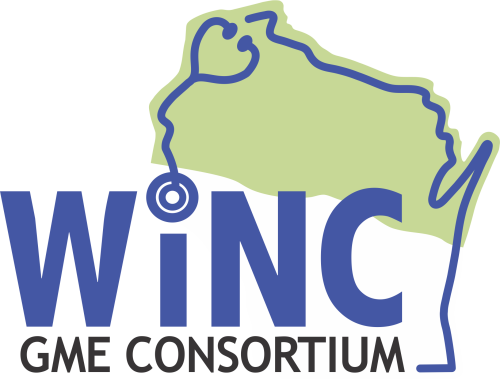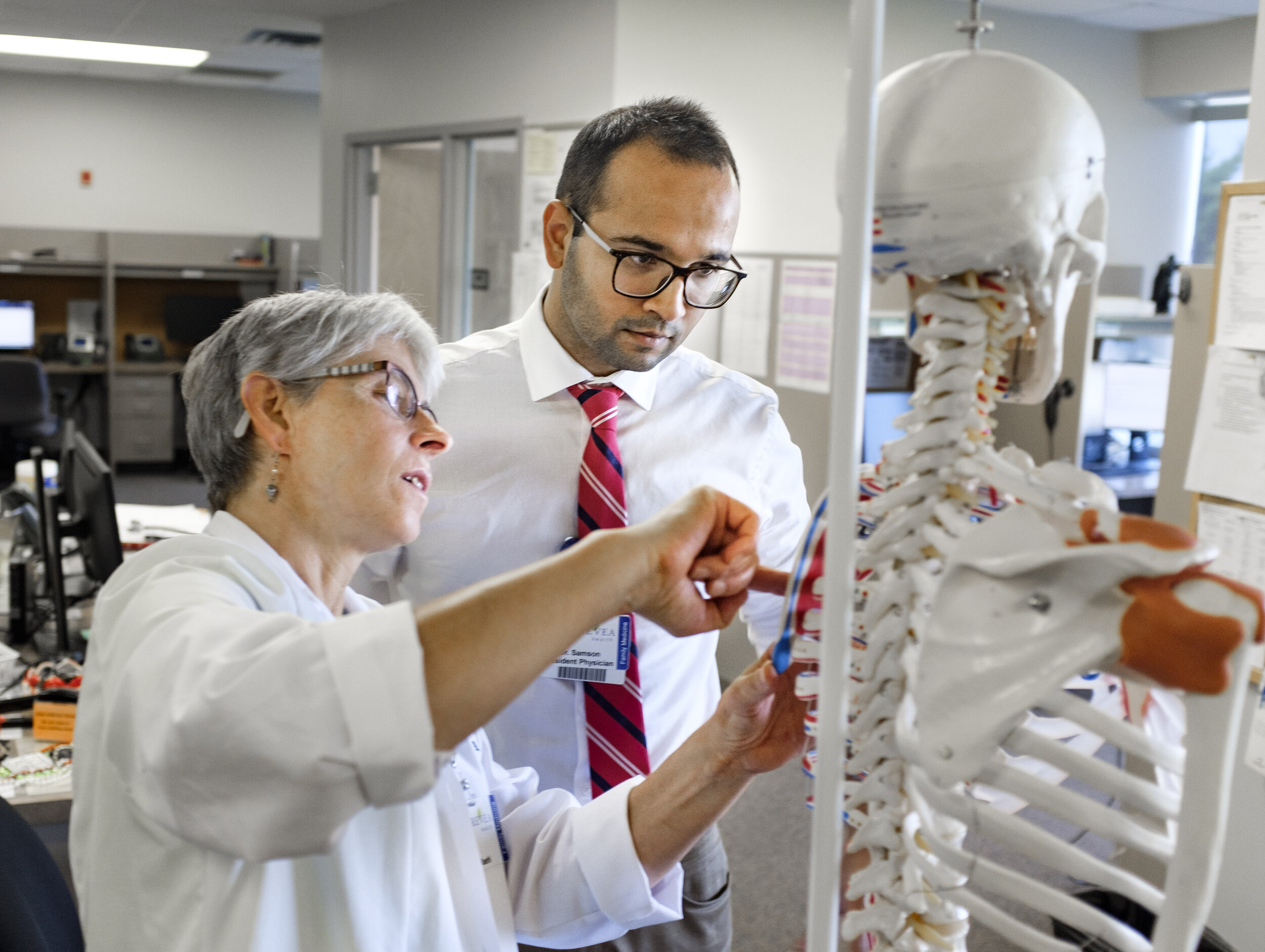Eau Claire & Augusta Curriculum
The program embraces evidence-based medicine, competency-based curriculum, as well as longitudinal studies. We are committed to providing high-quality educational and clinical experiences that help meet the resident’s career goals.
Each resident learns how primary care physicians appropriately involve specialists on each rotation. Curriculum, evaluations, and program improvement are designed to ensure residents obtain competence in six core areas:
Patient Care
Medical Knowledge
Practice-Based Learning and Improvement
Interpersonal and Communication Skills
Professionalism
Systems-Based Practice
The osteopathic residents participate in the UW DFMCH Statewide Osteopathic Collaborative. Through statewide workshops and local experiences, they are trained in and evaluated on osteopathic manipulative medicine (OMM), an additional core competency for osteopathic residents.
Evidence-Based Medicine (EBM)
The practice of evidence-based medicine requires lifelong learning and information mastery to allow physicians to continuously remain up to date while improving clinical behavior and patient outcomes. We incorporate EBM in our teaching and patient care. To assist the residents in focusing on EBM, we provide:
Computers with internet access for all residents
Inclusion of an EBM component in virtually all education conference topics
Instruction on practical EBM techniques and critical appraisal of the medical literature
Evidence-based approach to ordering laboratory tests
Longitudinal Studies
Our longitudinal approach allows for studying and developing necessary skills throughout residency training using a variety of settings and methodologies. In addition to the structured curriculum for required rotations, longitudinal study includes didactics, competency-based training, patient care, direct observation, video recording and medical simulation.
Cardiology
Working with community cardiologists, residents learn to diagnose and treat problems of the cardiovascular system pertinent to family medicine. Residents experience patient care in both inpatient and outpatient settings, including stress testing and learn the appropriate involvement of specialists and the coordination of health care personnel in the care of the hospitalized cardiac patient.
Community Medicine
Assignments in Community Medicine are a part of the Longitudinal rotation curriculum throughout the three years of residency. Each resident participates in longitudinal community outreach experiences which may include the Eau Claire City-County Health Department, Aging and Disability Resource Center, Regional Juvenile Detention Center, Chippewa Valley Free Clinic, and community educational presentations. Residents gain knowledge of population health as they apply care to patients and families in their community context.
Critical Care Unit/Intensive Care Unit
By the end of this rotation, residents diagnose and manage patients with acute and chronic pulmonary conditions: pneumonia, chronic obstructive pulmonary disease, acute respiratory distress, cardiopulmonary arrest, pulmonary edema and sleep disorders. The Family Medicine Teaching Service follows their patients in the ICU.
Dermatology
Residents participate in hands-on experiences with a dermatologist and through a longitudinal component of this curriculum, and learn to diagnose and manage dermatologic problems and perform dermatologic procedures common to family practice. Residents complete American Academy of Dermatology training modules to round out this experience.
Emergency Medicine
Residents spend rotation time in the emergency department of Sacred Heart Hospital, as well as the St. Paul Children’s Hospital emergency department. Residents learn prompt assessment, intervention and disposition, which are critical skills for emergency medicine.
Family Medicine Service
PGY1 residents learn to practice inpatient Family Medicine and utilize appropriate community resources and hospital interdisciplinary teams (social workers, dieticians, palliative care providers). PGY1 residents also participate in hospital rounding with family physician faculty, senior residents and medical students and write documentation in the patient record.
As a PGY2 or PGY3, the resident is responsible for direct inpatient care with progressive levels of responsibility. Residents diagnose, provide proper therapeutic management, and consult with specialists for the common major diseases when appropriate. Senior residents also supervise and teach PGY1 residents and medical students.
General Surgery
Residents learn to assess patients with potential surgical problems, care for them pre-operatively and post-operatively, and assist the surgeon during operative procedures. This curriculum emphasizes the following:
The importance of the family physician and surgeon collaborating as partners in the evaluation of and decision-making for the care of surgical patients
The principles involved in differentiating the causative origins of clinical symptoms resulting in the need for medical versus surgical intervention
Sensitivity to the patient’s and family’s concerns regarding the potential need for surgical intervention
Gynecology
The primary educational goals during this rotation are for residents to be able to diagnose and treat gynecologic problems, perform gynecologic procedures and know when to obtain gynecologic consultation.
Hospitalist and Internal Medicine
During the hospitalist rotations, residents learn to diagnose, treat, and manage patients as inpatients. Each resident has the opportunity to work with several hospitalists and internal medicine physicians. Residents also learn important communication skills required to accept a patient and transfer the patient back to their own primary care physician.
Human Behavior and Mental Health
Residents learn how to care for patients’ physical and psychosocial needs. This is accomplished through a four-week rotation, as well as a longitudinal, competency-based curriculum, combined with individual coaching from our faculty clinical social worker.
We teach major aspects of mental illness, motivational interviewing, mindfulness and cognitive behavioral therapy, in addition to assessment skills, family counseling skills, and community agency referrals. Using a solution-focused approach, residents learn to help patients change their lifestyle to positively impact their health.
Infectious Disease
The resident will learn to diagnosis and manage patients with usual, unusual, and complex infectious diseases.
Management of Health Systems (Practice Management and Quality Improvement)
Management of Health Systems training is part of the Longitudinal rotation curriculum throughout the three years of residency. This rotation includes the following:
Exploring different practice organizational and business models
Developing skills needed to efficiently lead and improve a medical practice
Personnel management, including an active role in resident recruitment and interviews
Negotiation of physician contracts
Coding and billing
Medical records
Residents attend clinic staff meetings throughout their residency, and lead an interdisciplinary team to complete a quality improvement project.
Maternity (OB) / Inpatient Pediatrics
Maternity care has long been a strong component of the Eau Claire residency program. The Maternity/Pediatrics rotations take place at Sacred Heart Hospital, which offers a balanced experience in low-risk, high-risk, and operative obstetrics. The hospital has a friendly, high-touch style comfortable for family physicians and their patients. As family physicians, residents learn to care for the mother/child dyad during this rotation. Residents are taught by community obstetricians, pediatricians and family physicians on this rotation. All family medicine faculty members practice and teach maternity care. Residents also lead and participate in mock OB codes at Sacred Heart Hospital. Residents are taught obstetrical ultrasound skills in our clinic by residency faculty. Additionally, residents on this rotation are responsible for pediatric admissions to the hospital.
Musculoskeletal Systems (Orthopedics and Sports Medicine)
The ultimate goal of this curriculum is optimal patient care by the family physician, with or without an orthopedic consultant. During these rotations, residents learn how to order and interpret appropriate diagnostic tests, diagnose and manage common musculoskeletal problems and manage pre- and post-operative care of orthopedic patients. Residents also perform common procedures such as closed reductions, splinting, joint injections and aspirations.Residents work with university athletic trainers and participate in on-the-field sports medicine experiences.
Neurology
Residents diagnose and manage common neurologic problems and learn when to refer the patient to a specialist. Residents are also involved with rehabilitation services of patients with neurologic problems at the area’s only inpatient Rehabilitation facility e.g., stroke, head trauma, etc. at HSHS Sacred Heart Hospital. Sacred Heart Hospital is also a certified Primary Stroke Center with the highest level of stroke treatment in the region. Residents will also utilize “Shelton,” the robot with neurotelemedicine.
Ophthalmology
Residents diagnose and manage ophthalmic problems, perform complete history and physical exams of the ophthalmic system, use a slit lamp, perform tonometry on patients in the office setting, recognize and treat corneal abrasions, and discuss diagnosis and treatment of ophthalmic conditions.
Osteopathic Curriculum
DO residents learn and perform osteopathic manipulation under direct guidance from our osteopathic faculty physicians. They have the opportunity to perform OMT on their own clinic patients as well as participate in OMT hospital rounds. Our osteopathic faculty provides direct supervision during OMT visits further enhancing our DO residents’ osteopathic skills. Eau Claire/Augusta residents also join other Wisconsin DO residents for quarterly day long OMT workshops through the University of Wisconsin Statewide Osteopathic Collaborative. The quarterly workshops provide residents with additional hands on training and educational experiences with statewide osteopathic faculty.
Otolaryngology (ENT)
Our preceptors work one-on-one with residents to educate them in diagnosing and managing ear, nose, and throat disorders Residents are trained to use the indirect laryngoscope, nasal speculum, head lamp, otoscope and cerumen spoon.
Pediatrics
Eau Claire and Augusta residents gain a broad range of pediatric experience in both inpatient and outpatient settings.
PGY1 residents complete 2 Maternity/Inpatient Pediatrics rotations, and care for newborns and sick children at HSHS Sacred Heart Hospital. During the second part of the academic year they work at Children’s in St. Paul, MN, with an inpatient team to treat pediatric patients with acute and chronic illnesses.
Residents in their PGY2 and PGY3 years round out their pediatric training experience with two four-week rotations with local pediatricians in outpatient practices. PGY3 residents also experience an additional two-week rotation at the St. Paul Children’s Emergency Department.
Pulmonology
During this rotation, residents learn to diagnose and manage patients with common pulmonary conditions such as COPD, asthma, pulmonary nodule, pneumonia, pleural effusions, and pulmonary embolism.
Radiology
Residents learn appropriate test selection, participate in invasive imaging and interpreting radiologic images from outpatient and inpatient settings with highly skilled radiologists.
Urology
Residents diagnose and manage patient urological problems and perform common urological procedures. Residents gain a clear understanding of normal growth, development, and variants of urogenital anatomy through the life span. They also assess and treat common reproductive tract infections, diseases of the anogenital tract, and neoplastic disease of the genital tract.
Wound Care
Residents will learn the basic principles of wound care management and how to assess, differentiate, and manage venous and arterial ulcerations. By the end of the rotation, residents will have learned how to prevent, identify, and treat pressure ulcerations and understand principles of preventing and managing diabetic foot ulcerations and their complications. Lastly, residents will understand the role of hyperbaric oxygen therapy in the management of chronic wounds
Prevea Family Medicine Residency
617 W. Clairemont Ave Eau Claire Wisconsin 54701 (715) 839-5177 residencyinquiry@prevea.com
What residents are saying…
“The Eau Claire Family Medicine residency has a very nice balance between obtaining an excellent education and having time to spend with family and pursuing interests outside of medicine.”
-Kirsten Stotz, DO and Michael Stotz, DO (graduates)

